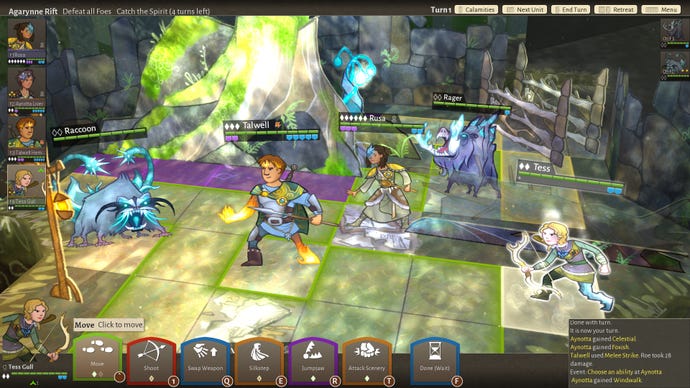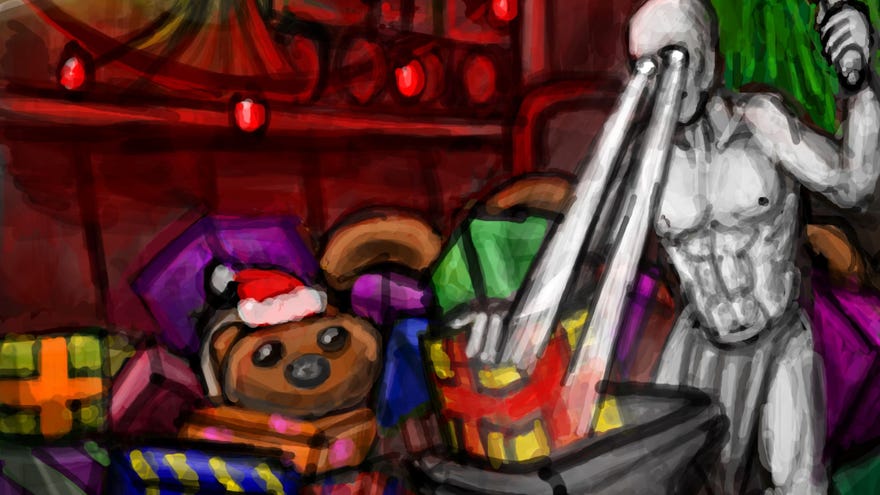The RPS Advent Calendar 2021, December 22nd
No adventure is the same twice
Gather round, readers, and I'll tell you the tale of the time I opened the 22nd door on the RPS Advent Calendar. I was with three friends, and we'd been adventuring together for years at this point - two of us were lovers, and yet a third had made a strange pact with a wolf God. We could do anything together, we four. And then we stumbled upon this door...
It's the grand tales of adventure from Wildermyth!
Sin Vega: Seeing this succeed has been the highlight of my year. Not just for inflating my ego, because I've been championing Wildermyth for years, but thinking about the hundreds of thousands of hours it means people have enjoyed with this absolutely phenomenal game.
We celebrate many games as "story generators", a phrase that could be mistaken for synonymous with "sandbox" given how often they coincide. There's an innate conflict between firm, writer-led narratives and dynamic, interpretive, user-driven ones. It wasn't until I played Wildermyth that I really believed the two could be combined so beautifully. Each of its main campaigns has a base story, with events mostly bookending chapters while you fill the middle with fighting and subplots. Along the way, your people will play out side stories to fill in the narrative of their lives. It's collaborative storytelling, in which each actor is a combination of randomly generated elements, excellently written personal events, and your actions and interpretations.
More than any game since 80 Days, it understands that grand adventures are filled with smaller moments. Most involve fighting, because that's what classical heroes do. But you'll also name a village, argue about songs, stumble across an ancient creature, flirt with a cultist, run out of supplies and try to catch a fish. Everything defines your characters as they grow from fragile nobodies to experienced, scarred, and often heartbroken heroes who you really feel have earned the tales others will tell about them.
Its excellent writing is sometimes poetic, often funny or silly, and happens to align with something you perceived about your fave uncannily often. There's one side story where two of my team visited an old friend, only to find her in mourning for a lover who'd suffered with a chronic illness her whole life. This was no huge dramatic crescendo or quest nagged into my journal. It had nothing to do with anything, except for those three old friends. For all its magic and bloodshed, Wildermyth gets that good stories are about people.

But it's a solid, innovative tactical game too. Up the difficulty just once and flanking and stealth become critical, and the value of each weapon becomes clear. Even relationships become tactically relevant; I had one quartet of youngsters who appeared weaker than their elders, but were such close friends and lovers that they were near untouchable if they stuck together. The semi-random options upon levelling encourage you to pick skills based on personality and lived experience, and to experiment and adapt to changing circumstances, using your wits and cunning over raw power or dull number-crunching (and even that is an option if you go for the hardest modes. Pro tip: never let the Thrixl get out of hand).
Magic users are particularly excellent. Their powers are intrinsically limited to what's present on a map, turning something as nondescript as a tree or a flag into a pivotal tactical element. There's no one size fits all. Apparently weak powers and items can combine into great ones, and underperforming fighters have their moment of glory. Even when someone dies, you can keep them for future games, removing the reluctance to use your best ones in case they get hurt, and giving C-listers a second chance to win your heart.
Above all its excellent tactics and all my gushing about narrative design, that's what makes Wildermyth really special: it makes room in your heart for memorable characters and moments of your own.


